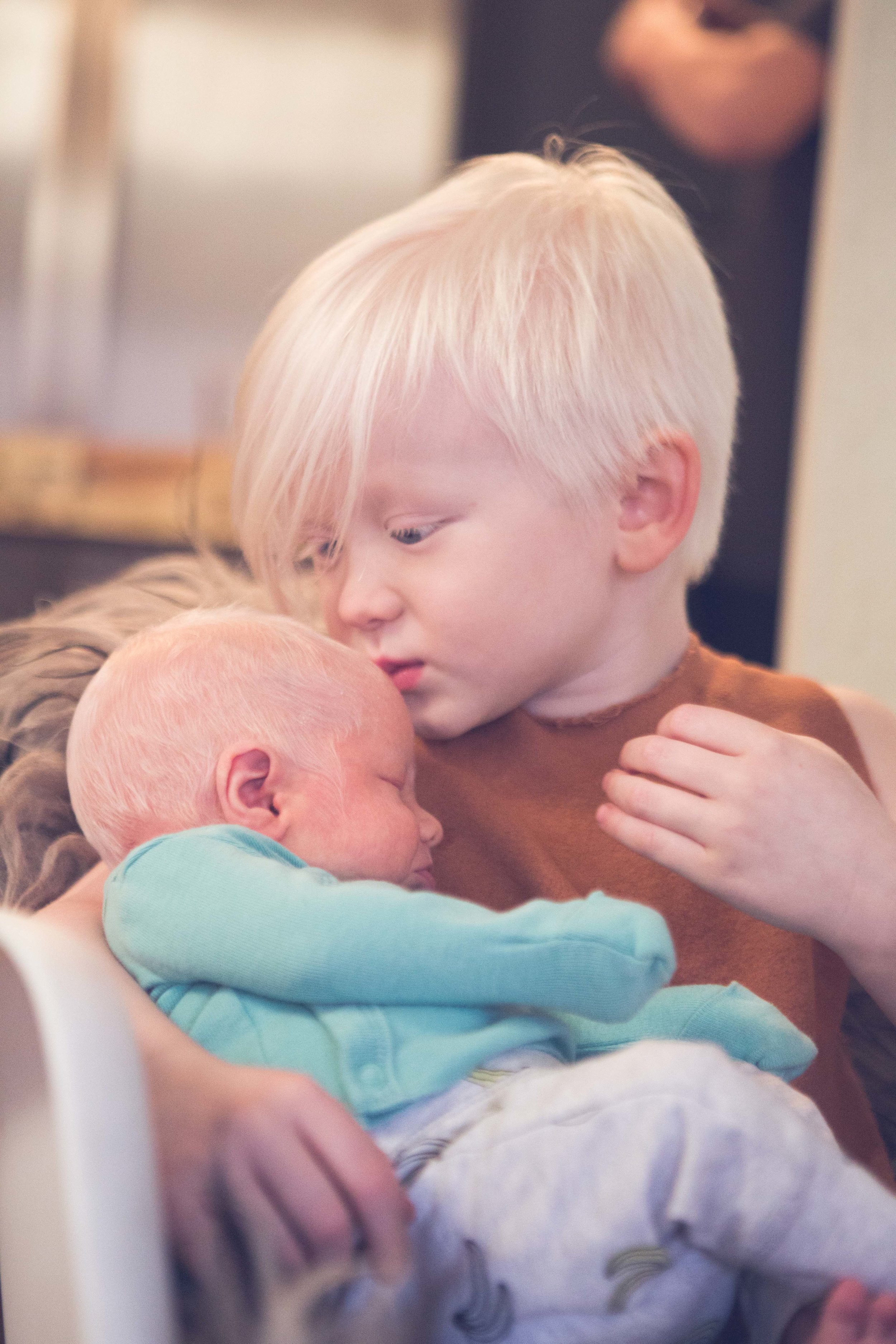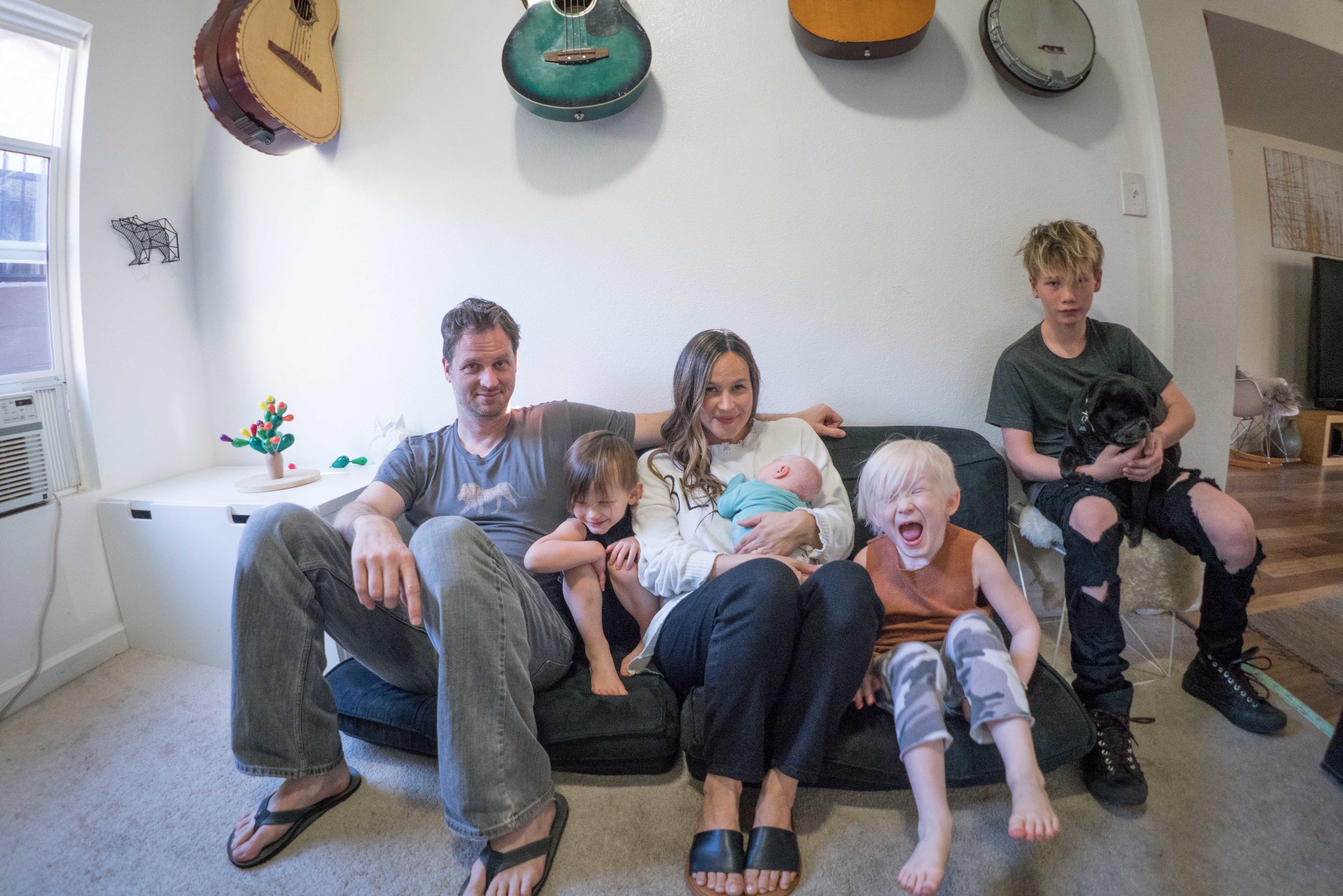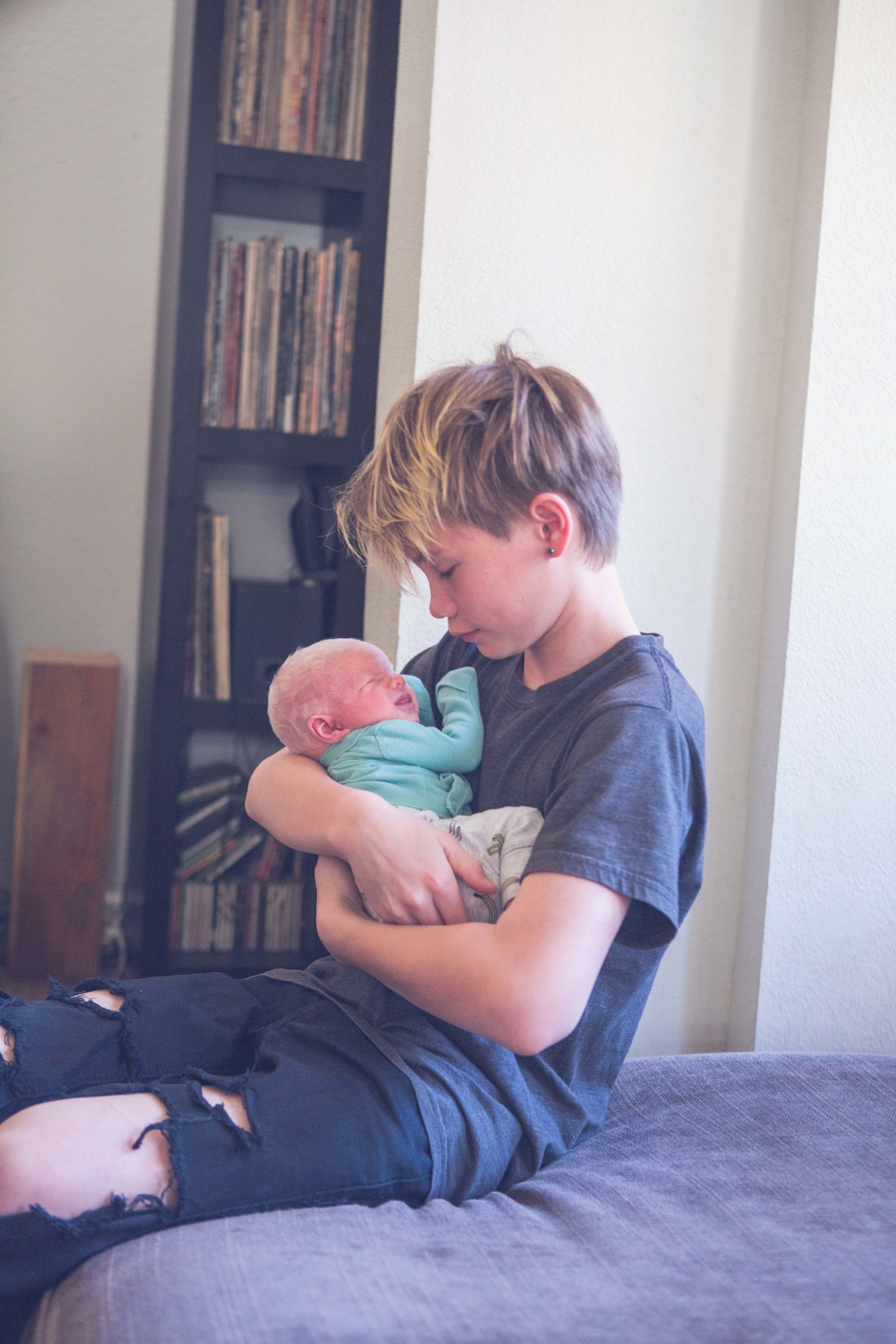How This Mom of Four Is Raising Awareness of Albinism and Empowering Her Kids
Photos: Cameron Jordan
It's an understatement to say that motherhood often comes with a string of surprises. Many women discover a fierce protective instinct that they didn't know they had, and this is especially true when their children are born with an unexpected condition. Patricia Williams is no stranger to the unpredictability of childbirth: The mother of four has two boys who were born with albinism.
The Fashion Mamas LA member and Black i Boys designer explains that she and her husband, Dale, initially didn't know that their second son, Redd, had the rare genetic condition. "We just thought he had really blonde hair," she says. "Once we learned that both [of us] were carriers, we knew it was a 25 percent chance for our babies to be born with albinism." Instead of viewing the diagnosis as a setback, she and her family decided to celebrate their children's uniqueness: "This made it really exciting to experience our last two sons’ births," she tells us.
Here, Williams gives us a glimpse into her family's life just a month after welcoming her fourth son, Rockwell. Below, she tells us more about her career journey, how she's navigating the conversation about albinism with her children, the most common misconceptions about the disorder, and her advice for other parents in her shoes — read it all below.
What are the names and ages of your children?
Gage, 12; Redd, 5; Wolfgang, 3; and Rockwell, 6 weeks.
Tell us a little bit about your career journey — what led you to become a designer?
After having my second child, I realized the need for an affordable, edgy infant and toddler basics line. I wanted basics that featured all the details I liked in my own clothes like black, soft vintage washes, frayed edges, cut out necklines, curled edges and a baggier fit. The baby clothes I did find with these features were incredibly expensive and I couldn’t justify paying for something that was going to be spit up on, stained, ripped or grown out of in 6 months. I was so determined that I could design this line myself, that I borrowed a friends sewing machine and just started cutting and sewing my own patterns without having any prior experience.
You have two sons with albinism. Can you tell us more about their birth stories?
When our second son Redd was born, we had no idea he had albinism, we just thought he had really blonde hair. Once we learned that both my husband and I were carriers, we knew it was a 25 percent chance for our babies to be born with albinism. This made it really exciting to experience our last two sons’ births.
During my labor with Rockwell, there was a point just before I pushed him out, where the doctor was holding a flashlight to get a look at Rockwell’s head. Next to him was my husband, and behind him were two male associates...all four men staring up my vagina with a flashlight when the doctor said, “Woah, he has some really blonde hair.” and I just knew! My husband smiled and said, “He’s an albino.” I squealed, my mother-in-law cried, and when we called my 91-year-old grandmother (also an albino) to tell her the news she cried out, “Oh no!” and made us all laugh.
"Kids can be so honest in such an innocent, yet totally hurtful way and we need to use those opportunities to educate them about albinism."
As a mother of two out of four kids with albinism, what has your journey been like? What were you most unprepared for?
Our first year with Redd, we quickly realized how much attention he drew when we were out in public. We got stopped everywhere we went by people curious about his white hair. Many times our son was the first albino he or she had ever seen so they'd ask more questions or would want to touch his hair. Last year he was picked up by a modeling agency in Los Angeles and has had various modeling jobs for clothing lines and even got a small part in a music video.
When Redd was younger, he refused to wear sunglasses and because of his sensitivity to sun light, we had to do a lot of beaches and playgrounds at dawn or at sundown, so he could play comfortably. This became fun for us because we usually were the only ones there. Now that he’s older, he knows to put on his hat, sunglasses and sunscreen before going outside and is good about reminding us if we forget. We carry a lot of sunscreen, and multiple sunglasses and hats in our car so we are always prepared for him to be outside.
I was most unprepared with the fact that the majority of those with albinism are legally blind. Redd was 3 months old when our optometrist told me he would most likely be legally blind and unable to get his drivers license. I remember crying all the way out to the parking lot and the entire drive home. We also dealt with nystagmus (the tracking of the eyes back and forth) and strabismus (one eye was cross eyed), [so he needed] multiple optometrist visits per year and have eye surgery on both eyes by the age of 4. Seeing Redd now and how easily he navigates through life, I don’t have those same worries or concerns with Rockwell.
In your experience, what are the most common misconceptions of albinism?
I think the biggest misconception is that they have red eyes. Because their eyes lack pigment, its most common for them to have very light blue eyes. In certain light, you can see right through to the blood vessels in the back of their eyes, causing them to reflect red or violet. Another large misconception with albinism is that he or she may have a mental disability, when this has nothing at all to do with albinism.
The scariest misconception is the way they are treated in certain parts of Africa, particularly Tanzania, where many of them are attacked and/or killed for their body parts. It was sickening to learn that someone just like our Redd, has to fear for their life of being hunted. A great website to gain more knowledge and to donate to those with albinism in Africa and Tanzania is Under the Same Sun.
How/when did you find out that your children have the condition?
Redd was 2 months old when we noticed his eyes constantly tracking back and forth so my husband decided to Google it. The first thing he read was that it was a common trait in infants with albinism. At the time, I had never heard of the word “albinism” and had to ask what it meant. I remember him looking at our son and saying, “White hair, pale skin, tracking of the eyes...he’s an albino.” My immediate response was “No he’s not...don’t they have red eyes?”
We then met with a genetics specialist and an optometrist who were able to confirm that Redd has OCA1 (Oculocutaneous Albinism Type 1) in which he produces little to no pigment in his skin, hair, and eyes. Being clueless as to how ignorant I sounded, I decided to ask, "But aren't they supposed to have red eyes?" The genetics specialist laughed and said that the only things he knew of with red eyes were rats. When I was pregnant with my third son, I met with a genetics specialist again to see if we could be tested to find out beforehand, but because it is so rare (affecting about 1 out of 17,000) we were told that by the time they would be able to get results back to us, I would've already given birth (and seeing the hair would be the first giveaway).
How do you respond to others' curiosity about your kids, and in turn how have you taught them to respond?
My husband and I have a silly rule we created that if a stranger makes more than three comments about our son's hair, then we will bring up the fact that he has albinism. Otherwise, I just smile and stay on guard in case they try to touch his hair without asking. Redd is definitely confident enough now (at the age of 5) to tell people to stop if they try and touch his hair, and to let people know that he's an albino and that it just means he has white skin, white hair and is really sensitive to the sun.
How do your other two boys interact with Redd and Rockwell? Are they protective?
My 3-year-old is still too young to really understand it but he adores Redd and the two of them are practically inseparable. My oldest is almost 13 and acts like a typical 13-year-old: [He's] either wrestling with them or teasing them; he especially loves holding Rockwell though.
There was a time a few years ago, when I picked up my oldest from school and he was visibly upset about something. When I asked him what was wrong, he said that some of his classmates had been making fun of Redd's eyes. I had already been dealing with my own version of this with smaller children at playgrounds, but to see my oldest son affected by it, was really heartbreaking. I told him that this is something that will most likely happen to Redd through most of his childhood, and that most of these kids making these comments have no idea what albinism is.
Kids can be so honest in such an innocent, yet totally hurtful way and we need to use those opportunities to educate them about albinism and to explain why Redd's eyes move back and forth. I've alway said the best defense we can give to Redd is to teach him how to be confident and give him the right things to say when he hears people making fun of him. My husband has always said the next best defense is to give him kung-fu lessons.
"The best defense we can give to Redd is to teach him how to be confident...My husband has always said the next best defense is to give him kung-fu lessons."
Some people with albinism have varying comfort levels with using the term. What are you/Redd most comfortable with using?
We've learned that many people are not familiar with the term "albinism" so a lot of the times we just use the term albino. In the albinism community, I'd say its about 50-50 in regards to those who prefer the term "albinism" vs. "albino". We have never viewed the term "albino" as offensive, so we just decided to teach Redd that its okay to refer to himself as an "albino" and as long as we don't treat that word as something negative, he won't view it as such.
What advice would you give other parents who are also in the same shoes?
Whether you have a child with albinism, or a child with special needs, social media has been a huge factor in helping me find communities and resources. I'm a member of three large albinism groups on Facebook, and have become friends with many other parents of small children with albinism on Instagram. I have learned so much from these groups and have been given so much support with all my questions and fears.
Through photos and posts, we've all watched each others children grow up and accomplish milestones that may seem small to others, but huge to us. Like when your baby first makes eye contact with you around 6 to 8 months old and you feel like you've been waiting for this moment forever and it makes you want to cry. Just know that you are not alone and that there is always someone out there understanding your struggles and cheering you on.







